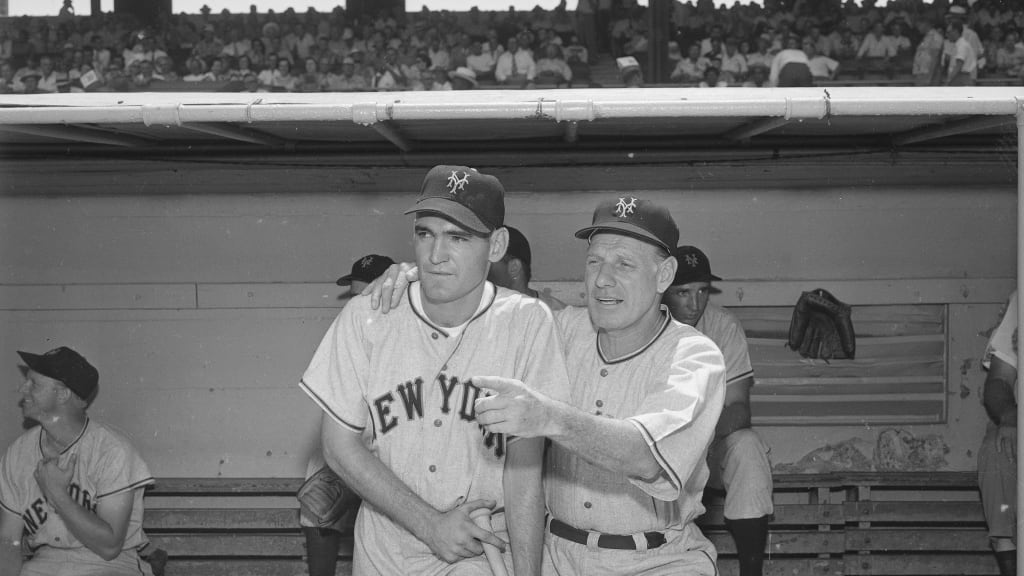
No one loves a good debate quite like baseball fans. With that in mind, we asked each of our beat reporters to rank the top players by position in the history of their franchise, based on their career while playing for that club. These rankings are for fun and debate purposes only.
This week, we’re spotlighting the best bench player in Giants history.
SAN FRANCISCO -- Hall of Famer Willie Mays delivered the signature defensive play of the 1954 World Series, making an iconic over-the-shoulder catch in Game 1 to preserve the Giants’ eighth-inning tie against the heavily favored Cleveland Indians.
But the signature offensive play came courtesy of Dusty Rhodes, whose stellar pinch-hitting led the Giants to their final championship in New York and cemented his legacy as the most impactful bench player in franchise history.
After Mays robbed Vic Wertz of the go-ahead hit, Rhodes came off the bench to deliver the decisive blow in the 10th inning, hitting a three-run home run off Indians starter Bob Lemon to lift the Giants to a 5-2 win. Rhodes’ game-winning shot traveled a mere 260 feet, barely clearing the Polo Grounds’ 257-foot right-field wall. Lemon responded by throwing his glove in frustration.
"Lemon's glove went further than my home run," Rhodes told the New York Daily News in 2008.
There was nothing cheap about Rhodes’ subsequent contributions, though. In Game 2, the left-handed hitter produced a game-tying, pinch-hit single and later added another homer, propelling the Giants to a 3-1 victory. And in Game 3, Rhodes drove in two more runs with a pinch-hit single, marking his fourth consecutive hit in the World Series.
Overall, Rhodes went 4-for-6 (.667) in the Giants’ four-game sweep of the Indians. He collected seven RBIs and two home runs -- both off future Hall of Famers in Lemon and Early Wynn. World Series MVP Awards weren’t instituted until the following year, but in his new memoir, “24: Life Stories and Lessons from the Say Hey Kid,” Mays asserts that the 1954 recipient would have undoubtedly been Rhodes.
“I've been around a lot of ballclubs for a lot of years, and usually when you look down the bench for a pinch-hitter, most of the guys are trying to hide behind each other,” former Giants manager Leo Durocher told the Christian Science Monitor in 1985. “They'll pinch-hit if you ask them, but for most of them it's the worst kind of pressure. But Dusty was different. He'd anticipate the situation every time, and when you turned to look for him, he'd already have a bat in one hand, and he'd be pointing at his chest, like he didn't want you to even think about anyone else. Then more times than you could expect, he'd go out and get the clutch hit for you.''
James Lamar Rhodes was born in Mathews, Ala., in 1927 and joined the Navy shortly after his 17th birthday. After two years of service, Rhodes received his discharge in 1946 and began playing Minor League ball. In 1952, he earned a contract with the Giants after hitting .347 with 18 home runs in Double-A.
The Giants were in need of outfield help at the time, as Mays had been drafted into the Army and Monte Irvin had broken an ankle during Spring Training. Rhodes came up and posted an .817 OPS with 10 home runs as a 25-year-old rookie, but he also committed nine errors in only 56 games in the outfield.
Rhodes’ defensive shortcomings prevented him from securing a regular job over his seven seasons with the Giants, but he carved out a role as Durocher’s go-to pinch-hitter once Mays and Irvin returned to reclaim their spots in the outfield.
“I ain’t much of a fielder and I got a pretty lousy arm, but I sure love to whack at that ball,” Rhodes told The New York World Telegram and Sun in 1954.
Rhodes thrived as a bench player in 1954, hitting .341 with a 1.105 OPS and 15 home runs over 82 regular-season games, but it was his four clutch hits during the Fall Classic that made him famous.
Durocher often summoned Rhodes to hit for Irvin, who starred in the Negro Leagues and was inducted into the Hall of Fame in 1973. But Irvin later insisted that he didn’t mind ceding key at-bats to Rhodes.
“Under other circumstances, maybe I would have been [upset],” Irvin said in 2008. “But Dusty was the greatest natural hitter I ever saw.”



